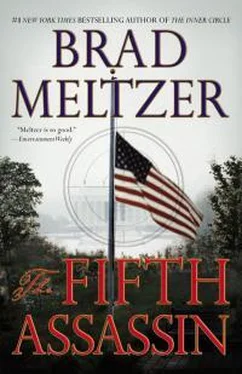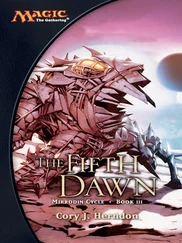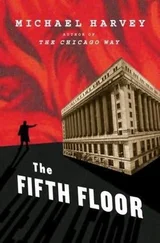Nico held tight to Rupert’s wrist, fighting to keep him in place and pulling the wound close to examine it. Maximum blood without hitting any major arteries, organs, or blood vessels.
“Don’t pull it out. It’ll make it bleed more,” Nico warned, lowering Rupert into a nearby desk chair.
“Th-That girl you were talking to this morning… that’s your daughter, isn’t it?” Rupert asked, his voice fading. “Is that what this’s really about?”
Nico looked down at Rupert, realizing he knew nothing about the President and what was coming. With a quick tug, Nico ripped the ID from Rupert’s neck and fished through his pockets, finding a set of keys. Now he had something to jam into the neck of the guard at the hospital’s main gate.
He headed for the open door of the loading dock.
Rupert clutched his own punctured arm, with the pencil still in it, toward his chest. “Y’know, Nico—even with all this, there’s only one thing I never lied to you about: You’re still a pain in my ass,” he called out, forcing a labored laugh.
Nico swiped the ID through the high-tech keypad. As the roll-top garage door slowly opened its mouth, a swirl of cold wind twirled through the loading dock. The sunlight was blinding as Nico strolled outside. Didn’t matter. Sliding one of the keys between his knuckles, he knew exactly where he was going.
94
One hour later
Make a right here,” Palmiotti says.
“You sure?” I ask, squinting through the windshield at yet another unmarked turnoff.
“Yes. I’m sure. Here ,” Palmiotti insists.
I turn the wheel as hard as I can, nearly missing it. But as I’m learning, everything in the park is easy to miss. Indeed, as we weave our way up the mountain, there’re no warning signs, no directional signs, not even one of those diamond-shaped ones that reads Authorized Personnel Only . In fact, when it comes to the secrets of Camp David, the clearest secret is simply that if you don’t know where Camp David is, you have no chance of finding it.
“And another right here,” Palmiotti says as we turn onto another narrow road that’s just as perfectly paved as the last one. In a clean, straight line, all the snow is meticulously pushed to the sides. No question, Palmiotti knows where he’s going.
Originally built back in 1938 as a summer camp for federal employees, Camp David first came on the presidential radar when FDR’s doctors said that the White House was too hot for Roosevelt—that the President needed a cool-weather retreat. As they looked around, they realized that the camp, because of its elevation in the mountain, was always ten degrees colder than downtown D.C. Right there, the employees lost their camp and FDR gained what he called “Shangri-La,” naming it after a mountain kingdom in one of his favorite novels.
To no one’s surprise, when Eisenhower took over the presidency, he loved the retreat. But he hated the name, rechristening it after his grandson David. By now, Camp David has become far more than a presidential weekend house. In today’s world, it’s one of the only places where the President of the United States can truly leave the chaos of his life behind.
When it was first opened, FDR made twenty-two trips to Camp David. Ronald Reagan made one hundred and eighty-seven—and it wasn’t just because travel got easier by helicopter, or because the place has its own golf green, driving range, movie theater, swimming pool, and bowling alley. For any President, Camp David’s best perk is simply this: There’s no press allowed.
When Bill Clinton took office, he said his allergies prevented him from visiting Camp David. But when he heard that the press was barred from the retreat, his allergies were cured. It was no different for Barack Obama or George W. Bush, who personally spent well over a full year up here with no one watching.
Well, almost no one.
Up ahead, the empty road straightens out. But as we approach a patch of particularly tall trees, the sun gets swallowed by the treetops and a long shadow crawls over us. Within seconds, my ears are so cold they start to ache. But it’s not until I glance to my left that I feel the real chill.
I spot it immediately—in the forest—just beyond the first line of trees: a tall metal fence. Chain-link. Coated brown so it blends in with the forest.
I hit the brakes just to get a good look. According to Palmiotti, there are three different fences that surround Camp David’s one hundred and eighty forested acres—plus marine guards, Park Service guards, and of course the Secret Service. So the fact we’re even seeing this first fence…
“We’re close, aren’t we?” I ask Palmiotti.
He doesn’t answer.
I look at the clock. Twenty-five minutes to go.
As I turn toward Palmiotti, he’s once again staring in the rearview. But the way his eyebrows dive… He definitely sees—
A loud knock on my driver’s-side window makes me jump in my seat. I catch sight of someone else in the rearview.
They’re behind us. And on the sides of us. Within seconds. Two men in dark green parkas and matching dark sunglasses. The logos on their chest say National Park Service , but I’ve never seen Park Service guys with guns on their belts.
“Can I help you?” the officer outside my window asks in that tone that feels like a punch. He pulls off his sunglasses, revealing a scattering of acne on the bridge of his nose.
“We’re here to see the President,” I tell him.
Now he’s even angrier. He shoots a look at his partner, then back at me. “I need to see some ID. Now.”
“Actually, Officer, I think all you need to see is him ,” I say, pointing to the passenger seat.
Next to me, Palmiotti ducks down just enough so that the officer gets a good look at him. Acne-face goes white, taking a full step back. To work security at either Camp David or the White House, they make you memorize flash cards with photos of every VIP. Even the perimeter guards know the President’s dead best friend when they see him.
“This is the part where you call your boss,” Palmiotti says.
The officer nods and pulls out his walkie-talkie.
95
Eighteen years ago
Sagamore, Wisconsin
And this was his ?” Beecher asked.
“It was his,” Marshall said, sitting on the edge of the treehouse’s foldout bed and flipping through the pages of a magazine called Escort . “Now it’s ours .”
“So you’re telling me Pastor Riis likes to look at that —at some fake-boobied woman who plays tennis without her top on?” Beecher asked, a deep crinkle in his forehead as he sat next to Marshall and pointed at the photo of a woman pressing her breasts against the strings of a tennis racket.
“Beecher, please don’t ruin this for me. We’re twelve-year-old boys and I found a stash of porn. I want to keep looking at this until I’m blind.”
“That’s fair, but—” Beecher leaned in slightly as Marshall turned the page… to a shot where the tennis player was now completely nude. “Y’know, I understand why you’d take your shirt off to play tennis—but there’s something that makes no sense about taking off your bottoms .”
“Maybe it’s hot out there.”
“Maybe. But your bottoms…? There’s something that—Maybe it’s me, but that doesn’t seem very hygienic.”
“No, I agree. Especially when… look… that’s a clay court.”
The two of them leaned in, squinting to see.
“Definitely clay,” Beecher agreed, though the crinkle still wouldn’t leave his forehead. “Marsh, can I just say: I love that you found us all these free nudie shots, but we need to be smart and get rid of it.”
Читать дальше











